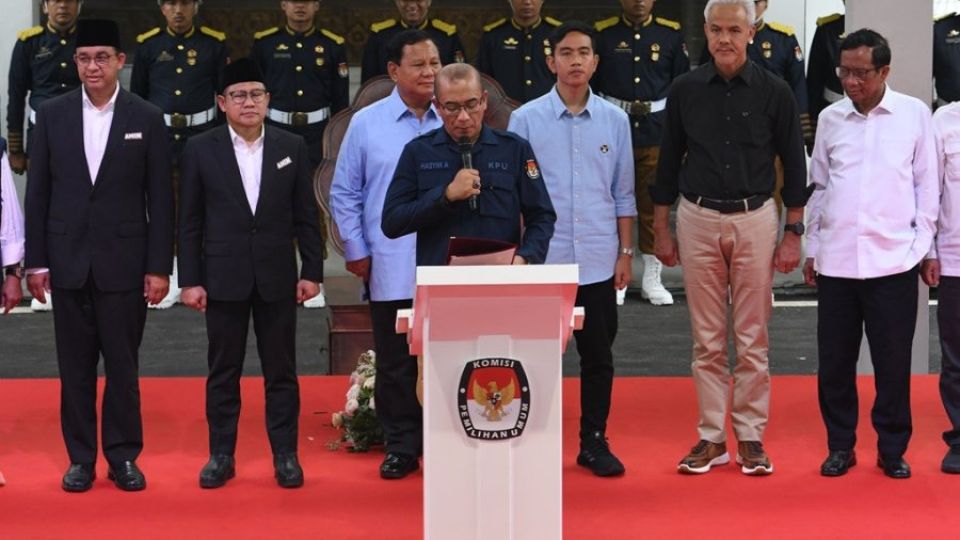December 4, 2023
JAKARTA – Frontrunner Prabowo Subianto of Gerindra Party kicked off his presidential campaign over the weekend in his stronghold of West Java, days after his two rivals hit the road on the first official day of the campaign season to secure their spots in the run-off.
The defense minister began on Saturday in Tasikmalaya, a city in West Java known as “kota santri”, or city of Islamic boarding school students. In a rally there, his supporters chanted “West Java still belongs to Prabowo”.
West Java has traditionally been a reliable source of votes for Prabowo, who secured 59 percent of the vote there in two previous elections against then-rival President Joko “Jokowi” Widodo. But recently, the country’s most populous province has seen a growing bloc of electorate shifting to rival Anies Baswedan, who is widely seen as an opposition candidate.
Prabowo is making his third run for the presidency, with Jokowi’s eldest son Gibran Rakabuming Raka as his running mate against former Central Java governor Ganjar Pranowo and running mate Mahfud MD and the Anies-Muhaimin Iskandar pair.
At the rally in Tasikmalaya, Prabowo thanked his supporters for their unwavering support and apologized for not coming back to the city after his bruising defeat in the 2019 election, saying that he “fell at the time, but now is ready to rise”.
Prabowo pledged to develop various industries and the workforce, and to end poverty. “There should be no children who have difficulty drinking milk. There should be no young people who have difficulty finding work,” he said.
He also stopped by two pesantren (Islamic boarding schools), Miftahul and Cipasung, which have ties with rival camps, in an apparent attempt to prevent his rivals from gaining ground in West Java.
Prabowo’s running mate Gibran attended the final match of the U-17 World Cup in Surakarta, in his capacity as the mayor of the city which is cohosting the country’s inaugural FIFA tournament. Gibran made time during the day to welcome dozens of members of majelis taklim (religious congregations) declaring support for their bid.
‘Comfort zone’
Prabowo’s camp claimed he and Gibran did not start their campaign on the first day of the campaign season last Tuesday because they had to attend to their tasks as defense minister and mayor of Surakarta, respectively.
Ganjar and Mahfud began their campaign last week at opposite ends of the vast archipelago, Ganjar in the easternmost city of Merauke in South Papua and Mahfud in the westernmost city of Sabang in Aceh, while Anies and Muhaimin started in their respective perceived strongholds, Jakarta and East Java.
Prabowo and Gibran instead had their political machinery lay the groundwork for their campaign, distributing free milk and lunches to schoolchildren in a bid to combat stunting.
“They have been so far relying on the solid teamwork of the alliance of nine political parties and the campaign team, which incorporates professionals, politicians, volunteers and people from various other backgrounds. This is one of their clear advantages,” analyst Agung Baskoro said.
He noted, however, that relying on political machinery would not be enough, saying that Prabowo and Gibran needed to act beyond their “comfort zones” and greet potential voters directly.
“Like it or not, President Jokowi and former president Susilo Bambang Yudhoyono’s victories were largely determined by how extensive they toured the country and met voters in person. Such interactions can help voters decide whether they can rely on the candidates to solve their daily problems,” Agung said.
Tight race
Ganjar and Anies wasted no time on the first day of the campaign season in hopes of preventing Prabowo from having an easy victory on election day after he widened his lead in opinion polls, Kennedy Muslim of pollster Indikator Politik Indonesia said.
“A fierce battle will now likely occur between [Ganjar and Anies] to ensure their entry into the second round and prevent the election from shaping up into a single round,” Kennedy said.
The Prabowo-Gibran pair is the frontrunner in various surveys because many Jokowi supporters are shifting their support from Ganjar to Prabowo.
The pair is eyeing to win in a single round, which requires a candidate to win more than 50 percent of votes. Analysts predicted that the campaign season would be tense given that “about 20 percent of voters are undecided and those who are still susceptible to change their minds”.
In their first week of campaigning, Ganjar turned to programs in rural areas, such as addressing disparity of health facilities and salaries of Quran teachers, after Ganjar’s Indonesian Democratic Party of Struggle (PDI-P) parted ways with Jokowi, which has a strong supporter base in rural areas.
“This was so that Ganjar and the PDI-P could prevent a greater shift in support in rural areas,” Kennedy said.
Anies’ focus in Jakarta was to retain his voter base or capture more voters who have grown tired of Jokowi’s leadership. His campaign started in the densely populated and impoverished neighborhood of Tanah Merah, where he kicked off his 2017 Jakarta gubernatorial campaign and helped residents tackle a land dispute while serving as governor.
“Real issues that had been latent and had not been resolved, such as land conflicts, are suitable for Anies’ campaign, because he can connect them to his success stories as Jakarta governor,” Kennedy said.


